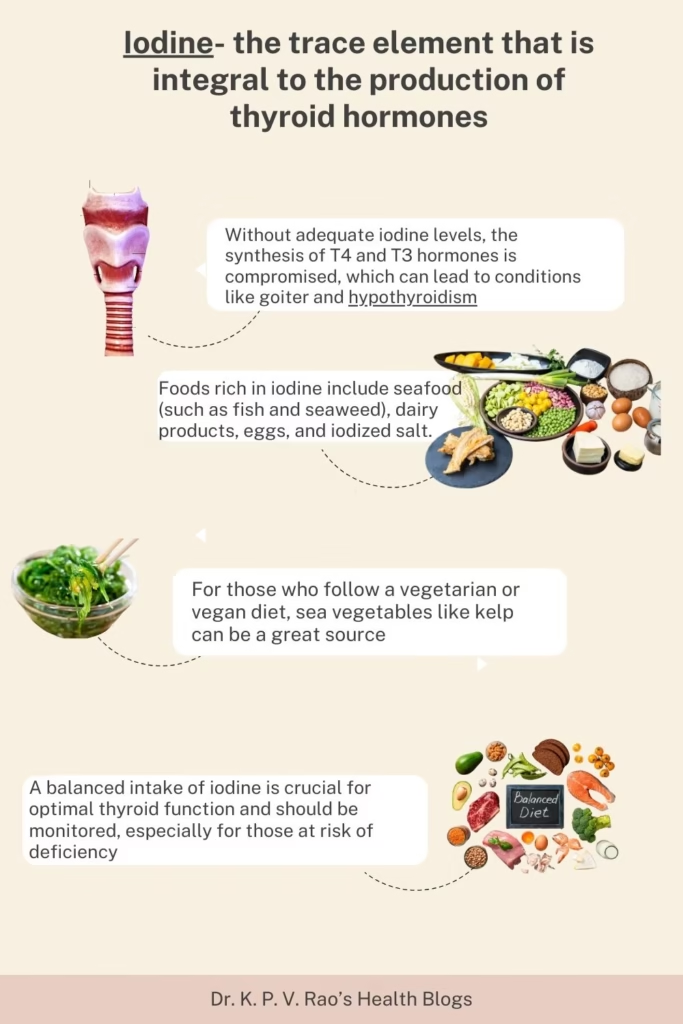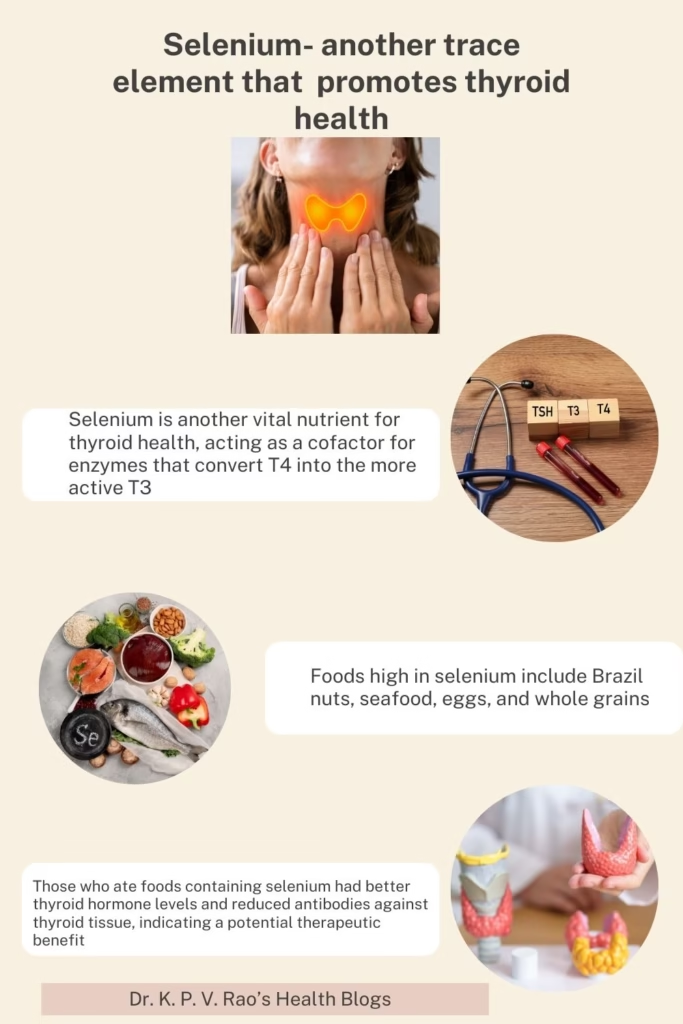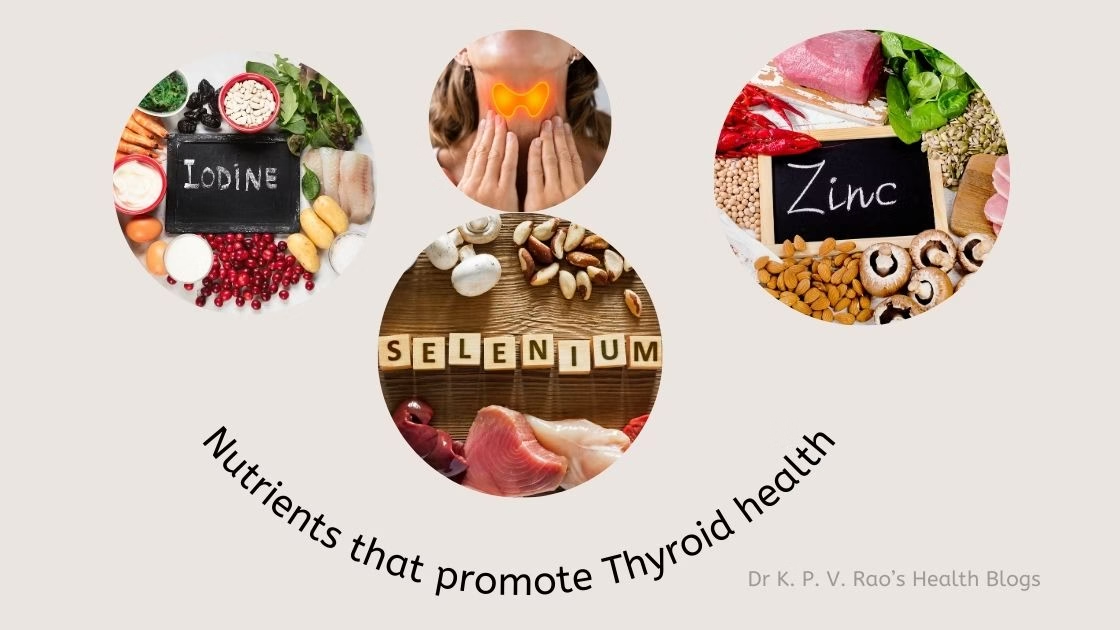Learn about Iodine, Selenium, and Zinc and Their Effects on Thyroid Hormones—Plus Practical Tips for Dietary Management
Introduction to Thyroid Health
Thyroid gland is an important organ that promotes body metabolism and growth. I had written an article about this gland earlier. To know how important it is, you can read this article.
Today we discuss how we can promote good thyroid health through nutrients present in the foods we eat. So, without much ado, let’s begin-
The Importance of Nutrients for Thyroid Function
Why Nutrients Matter
Nutrients play a pivotal role in thyroid health as they contribute to hormone production, metabolism regulation, and overall gland functionality.
Vitamins and minerals are essential for converting the inactive T4 hormone into the active T3 hormone. A deficiency in crucial nutrients can impair these processes, leading to thyroid dysfunction and associated health complications.
The Connection Between Diet and Thyroid Health
A well-rounded diet supports not only thyroid function but also general well-being. Research has shown that certain nutrients help improve thyroid activity, while others can hinder hormone production. This understanding highlights the importance of dietary choices in maintaining thyroid health and preventing potential disorders.
Diving into Iodine
What is Iodine and Why is it Essential?
Iodine is a trace element that is integral to the production of thyroid hormones. Without adequate iodine levels, the synthesis of T4 and T3 hormones is compromised, which can lead to conditions like goiter and hypothyroidism. While iodine deficiency is less common in developed countries due to iodized salt and fortified foods, it remains a significant concern in many parts of the world.
Sources of Iodine in Your Diet
Foods rich in iodine include seafood (such as fish and seaweed), dairy products, eggs, and iodized salt.

For those who follow a vegetarian or vegan diet, sea vegetables like kelp can be a great source. Ensuring a balanced intake of iodine is crucial for optimal thyroid function and should be monitored, especially for those at risk of deficiency.
Case Study: The Impact of Iodine Deficiency
A notable case study from a region where iodine deficiency was prevalent showed that implementing iodized salt significantly reduced rates of goiter and hypothyroidism. This highlights the essential role of iodine in public health strategies aimed at improving thyroid health. Recognizing the importance of dietary iodine can steer individuals towards making more informed choices about their nutrition.
Unpacking Selenium
The Role of Selenium in Thyroid Function
Selenium is another vital nutrient for thyroid health, acting as a cofactor for enzymes that convert T4 into the more active T3. It also has antioxidant properties that help protect the thyroid gland from damage caused by oxidative stress. Adequate selenium levels can support thyroid hormone production and overall gland function, making it crucial for those with thyroid disorders.

Food Sources Rich in Selenium
Foods high in selenium include Brazil nuts, seafood, eggs, and whole grains. Incorporating these foods into your diet can help ensure you meet your selenium needs. For those considering supplementation, consulting a healthcare provider is essential, as excessive selenium can cause negative health effects.
Case Study: Selenium Supplementation and Thyroid Health
In a clinical trial, selenium supplementation was shown to improve thyroid function in patients with autoimmune thyroiditis. Participants who took selenium had better thyroid hormone levels and reduced antibodies against thyroid tissue, indicating a potential therapeutic benefit. This study underscores the importance of selenium in thyroid health management.
Useful Article- Treatment with Myo-Inositol and Selenium Ensures Euthyroidism in Patients with Autoimmune Thyroiditis
Understanding Zinc
Zinc’s Contribution to Thyroid Hormone Production
Zinc is a trace mineral that plays a significant role in hormone production, including that of the thyroid. It helps in the synthesis of T3 and T4, making it essential for maintaining optimal thyroid function. Zinc also supports the immune system, which can be particularly beneficial for individuals with autoimmune thyroid conditions.
Where to Find Zinc in Your Meals
Rich dietary sources of zinc include meat, shellfish, legumes, nuts, seeds, and dairy products. For vegetarians, legumes and nuts can provide adequate zinc, but they should be mindful of phytates, which can inhibit zinc absorption. Ensuring sufficient zinc intake can help support thyroid hormone synthesis and overall gland health.
Case Study: Zinc Deficiency and Its Effects
A study conducted on individuals with thyroid disorders revealed that many had low zinc levels compared to healthy controls. Supplementing zinc improved their thyroid hormone levels, suggesting that zinc deficiency may play a role in thyroid dysfunction. This highlights the importance of monitoring zinc intake for those with thyroid issues.
Practical Tips for Dietary Management
Creating a Thyroid-Friendly Meal Plan
When planning meals, focus on incorporating a variety of foods that are rich in iodine, selenium, and zinc. A balanced plate might include grilled salmon (for iodine and selenium), quinoa (for zinc), and a side of steamed broccoli (which contains antioxidants). Planning meals around these key nutrients can help support thyroid health.
Foods to Include and Avoid
In addition to including nutrient-rich foods, it’s essential to be aware of foods that may hinder thyroid function. For example, excessive soy products or cruciferous vegetables like kale and cabbage can interfere with iodine absorption when consumed in large quantities. Moderation is key, and cooking these vegetables can help reduce their goitrogenic properties.
Supplements: When and How to Use Them
While it’s ideal to obtain nutrients from food, sometimes supplementation may be necessary, especially for those with diagnosed thyroid health issues like Hashimoto’s disease.
One of the supplements containing selenium available in India is tablet TPO, by Mattox Healthcare Ltd.
Always consult with a healthcare provider before starting any new supplements to ensure they are appropriate for your individual health needs and won’t interfere with any medications.
Conclusion
Recap of Key Nutrients
In summary, iodine, selenium, and zinc are essential nutrients that play critical roles in maintaining thyroid health and function. For health enthusiasts and individuals managing thyroid disease, focusing on a diet that includes these nutrients can lead to better health outcomes. Understanding the significance of these nutrients empowers individuals to make informed dietary choices that can enhance their well-being.
Encouragement for Thyroid Health Management
Striving for optimal thyroid health is a holistic journey that encompasses various lifestyle and dietary choices. By prioritizing nutrient-rich foods and understanding how they impact the thyroid gland, you can take proactive steps towards better health. Embrace this knowledge as part of your commitment to living a vibrant, healthy life.
Frequently Asked Questions
What are the primary nutrients for thyroid health?
The primary nutrients essential for thyroid health include iodine, selenium, and zinc. These nutrients support hormone production and overall thyroid function.
Can I get enough iodine from my diet?
Yes, most people can obtain sufficient iodine from a balanced diet that includes iodized salt, seafood, dairy products, and certain fruits and vegetables.
Is it safe to take thyroid supplements?
While some supplements may benefit thyroid function, it’s crucial to consult with a healthcare provider before starting any new supplements to avoid adverse effects or interactions with medications.
How can I tell if I have a nutritional deficiency affecting my thyroid?
Symptoms of nutritional deficiencies can vary, but common signs include fatigue, weight changes, and hair loss. A healthcare provider can perform tests to confirm deficiencies and recommend appropriate dietary changes or supplements.
Are there foods I should avoid for thyroid health?
Foods high in goitrogens, such as raw cruciferous vegetables and excessive soy products, may interfere with thyroid function if consumed in large amounts. However, cooking these vegetables can significantly reduce their goitrogenic properties.

